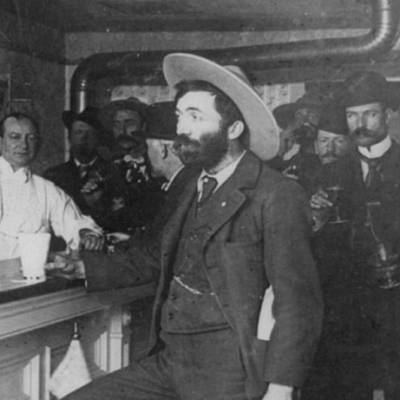
Soapy Smith
Childhood
Born on November 2, 1860, in Coweta County, Georgia, Jefferson Smith's early life was one of relative privilege. His grandfather was a wealthy plantation owner and Georgia legislator, and his father worked as an attorney. However, the aftermath of the American Civil War brought financial ruin to the Smith family. In 1876, seeking a fresh start, they relocated to Round Rock, Texas. It was in this Texan town that the young Jefferson began his journey into the world of confidence schemes. Tragedy struck in 1877 with the death of his mother, and shortly after, in 1878, he witnessed the demise of the infamous outlaw Sam Bass, an event that may have left a lasting impression.
Career
"Soapy" Smith's con career began in Fort Worth, Texas, where he formed the "Soap Gang," a disciplined group using "short cons" like the shell game, three-card monte, and rigged poker ("big mitt"). He earned the title "king of the frontier con men."
His famous "prize soap racket" involved wrapping money around soap bars, selling them, and having planted members win, enticing others to buy. He'd then auction the remaining soap, ensuring shills won the larger prizes. An arrest for this scam led to his nickname when a policeman, unable to recall his first name, wrote "Soapy" in the logbook.
Smith established three criminal empires: first in Denver, Colorado, where he bribed officials and controlled gambling by 1887, opening The Tivoli Club in 1888. His brother ran a nearby cigar store with rigged poker games. Soapy also ran fraudulent lotteries, a fake stock exchange, and rigged auctions.
When Denver reformed in 1892, Soapy moved to Creede, Colorado, establishing his second empire with his brother-in-law as deputy sheriff and opening the Orleans Club. He briefly exhibited a petrified man and ran his usual cons. Despite his criminal activities, he cultivated a Robin Hood image. The Creede boom ended, and a fire destroyed his club, leading him back to Denver.
In Denver, Smith continued his cons, including rigged railroad ticket schemes. He openly admitted to being a con man. He was temporarily deputized during the "City Hall War" of 1894. Facing pressure, he fled Denver.
Drawn by the Klondike Gold Rush, Soapy established his third and final empire in Skagway, Alaska, in 1898. He bribed the deputy U.S. marshal, opened a fake telegraph office for scams, and ran Jeff. Smith's Parlor as his base. His men infiltrated the community to exploit newcomers and steer them to his dishonest businesses and gambling dens.
Personal life
Details about Soapy Smith's personal life are somewhat scarce amidst his notorious career. He had a younger brother, Bascomb Smith, who was heavily involved in his criminal enterprises. He was married and had at least one son. However, the focus of historical accounts largely remains on his public activities and criminal dealings.
Revenue
It is difficult to provide a precise figure for Soapy Smith's revenue. His income came from a multitude of sources, including his successful "prize soap racket," rigged gambling games (poker, shell game, three-card monte), fraudulent businesses (fake telegraph office, stock exchange, auctions), and likely through bribes and protection money in the towns he controlled. He undoubtedly amassed significant wealth during his reign in Denver, Creede, and Skagway, though the exact amounts remain unknown. He was known to spend lavishly and also to give away money, further complicating any attempt to calculate his total earnings.
Interesting facts
- His nickname, "Soapy," originated from a newspaper report about his arrest for the prize soap racket where the reporter couldn't recall his first name.
- He cultivated a public persona that was sometimes surprisingly generous, using his ill-gotten gains to help the less fortunate, albeit strategically.
- He briefly commanded his own volunteer army, the "Skaguay Military Company," during the Spanish-American War, gaining official recognition and further consolidating his power in Skagway.
- His saloon in Skagway, Jeff. Smith's Parlor, became so influential it was known as "the real city hall."
- He famously told a reporter that he considered "bunco steering more honorable than the life led by the average politician."
- He purchased and briefly exhibited a petrified man named "McGinty" in Creede, using the waiting line as an opportunity to run more cons.
Legacy
Soapy Smith's legacy is one of a charismatic and cunning con artist who dominated the underworld of the American frontier and the Klondike Gold Rush. While he wasn't a traditional casino owner, his control over gambling operations in the towns he influenced was undeniable. He represents a fascinating, albeit dark, side of the history of gambling in the American West, where lawlessness and opportunity often intertwine. His story has been immortalized in numerous books, films, and television shows, cementing his place as a legendary figure of the era. The annual "Soapy Smith Wake" in Skagway serves as a quirky reminder of his dramatic life and death.
Frequently asked Questions
While not strictly a player in the traditional sense, Soapy Smith heavily influenced and controlled gambling operations in the towns where he established his empires. He ran rigged games and profited significantly from the losses of others.
He earned the moniker "Soapy" after being arrested for his "prize soap racket." A police officer, unable to recall his first name, simply wrote "Soapy" in the logbook, and the name stuck.
This was Soapy Smith's most famous con. He would sell bars of soap, some of which supposedly had money hidden inside. Only his accomplices ever "won" the prize money through sleight of hand, enticing others to buy the soap.
His criminal enterprises spanned the American West and the Klondike, with significant periods of operation in Denver and Creede, Colorado, and Skagway, Alaska.
He was killed in a shootout on Juneau Wharf in Skagway, Alaska, on July 8, 1898, during a confrontation with the "Committee of 101," a vigilance committee.
















